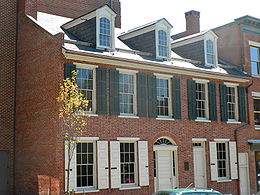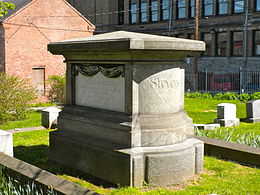- Thaddeus Stevens
-
Thaddeus Stevens 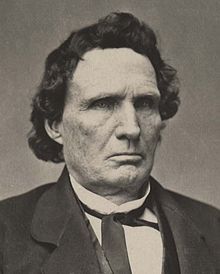
Member of the U.S. House of Representatives
from Pennsylvania's 9th districtIn office
March 4, 1859 – August 11, 1868Preceded by Anthony Roberts Succeeded by Oliver Dickey Member of the U.S. House of Representatives
from Pennsylvania's 8th districtIn office
March 4, 1849 – March 3, 1853Preceded by John Strohm Succeeded by Henry Mulenberg Personal details Born April 4, 1792
Danville, Vermont, U.S.Died August 11, 1868 (aged 76)
Washington, D.C., U.S.Political party Federalist, Anti-Masonic, Whig, Republican Spouse(s) none Profession Politician Signature 
Thaddeus Stevens (April 4, 1792 – August 11, 1868), of Pennsylvania, was a Republican leader and one of the most powerful members of the United States House of Representatives. As chairman of the House Ways and Means Committee, Stevens, a witty, sarcastic speaker and flamboyant party leader, dominated the House from 1861 until his death and wrote much of the financial legislation that paid for the American Civil War. Stevens and Senator Charles Sumner were the prime leaders of the Radical Republicans during the American Civil War and Reconstruction. A biographer characterizes him as, "The Great Commoner, savior of free public education in Pennsylvania, national Republican leader in the struggles against slavery in the United States and intrepid mainstay of the attempt to secure racial justice for the freedmen during Reconstruction, the only member of the House of Representatives ever to have been known, as the 'dictator' of Congress."[1]
Historians' views of Stevens have swung sharply since his death as interpretations of Reconstruction have changed. The Dunning School, which viewed the period as a disaster because it violated American traditions of republicanism and fair government, depicted Stevens as a villain for his advocacy of harsh measures in the South, and this characterization held sway for much of the early 20th Century.
Contents
Early life
Stevens was born in Danville, Vermont on April 4, 1792. His parents had arrived there from Methuen, Massachusetts around 1786. He suffered from many hardships during his childhood, including a club foot. The fate of his father Joshua Stevens, an alcoholic, profligate shoemaker who was unable to hold a steady job, is uncertain. He may have died at home, abandoned the family, or been killed in the War of 1812; in any case, he left his wife, Sally (Morrill) Stevens, and four small sons in dire poverty.[2] Having completed his course of study at Peacham Academy, Stevens entered Dartmouth College as a sophomore in 1811, and graduated in 1814; before doing so, he spent one term and part of another at the University of Vermont. He then moved to York, Pennsylvania, where he taught school and studied law. After admission to the bar, he established a successful law practice, first in Gettysburg in 1816, then in Lancaster in 1842. He later took on several young lawyers, among them Edward McPherson, who later became his protégé and ardent supporter in Congress.
Stevens never married but two of his adult nephews came to live with him. He shared his home and parental responsibilities with his mixed-race housekeeper of twenty years, Lydia Hamilton Smith.
Political life
At first, Stevens belonged to the Federalist Party, but switched to the Anti-Masonic Party, then to the Whig Party, and finally to the Republican Party. In 1833, he was elected on the Anti-Masonic ticket to the Pennsylvania House of Representatives, where he served intermittently until 1842.[3] He introduced legislation to curb secret societies, to provide more funds to Pennsylvania's colleges, and to put a constitutional limit on state debt. He refused to sign the new state constitution of 1838 because it did not give the right to vote to black citizens. He also came to the defense of a new state law, passed on April 1, 1834, providing free public schools. Newly elected members of the Pennsylvania State Senate tried to repeal the public education act, while the lower house tried to preserve it. Although Stevens had been reelected with instructions to favor repeal, in a great speech, he defended free public education and persuaded the Pennsylvania Assembly to vote 2-1 in favor of keeping the new law.
Stevens devoted most of his enormous energies to the destruction of what he considered the Slave Power, that is the conspiracy he saw of slave owners to seize control of the federal government and block the progress of liberty. In 1848, while still a Whig party member, Stevens was elected to serve in the House of Representatives. He served in congress from 1849 to 1853, and then from 1859 until his death in 1868.[4]
He defended and supported Native Americans, Seventh-day Adventists, Mormons, Jews, Chinese, and women. However, the defense of runaway or fugitive slaves gradually began to consume the greatest amount of his time, until the abolition of slavery became his primary political and personal focus. He was actively involved in the Underground Railroad, assisting runaway slaves in getting to Canada.[citation needed] A possible Underground Railroad site (which consists of a water cistern that shows evidence of being modified for human habitation) has been discovered under his office in Lancaster, PA. This office, along with Lydia Smith's home, is located next to the new conference center in the center of Lancaster; they may soon become a museum open to the public.
During the American Civil War Stevens was one of the three or four most powerful men in Congress, using his slashing oratorical powers, his chairmanship of the Ways and Means Committee, and above all his single-minded devotion to victory. His power grew during Reconstruction as he dominated the House and helped to draft both the Fourteenth Amendment and the Reconstruction Act in 1867.
Radical Republicanism
In July, 1861 the Congress passed the Crittenden-Johnson Resolution stating the limited war aim of restoring the Union while preserving slavery; Stevens helped repeal it in December. In August, 1861, he supported the first law attacking slavery, the Confiscation Act that said owners would forfeit any slaves they allowed to help the Confederate war effort. By December he was the first Congressional leader pushing for emancipation as a tool to weaken the rebellion. He called for total war on January 22, 1862:
"Let us not be deceived. Those who talk about peace in sixty days are shallow statesmen. The war will not end until the government shall more fully recognize the magnitude of the crisis; until they have discovered that this is an internecine war in which one party or the other must be reduced to hopeless feebleness and the power of further effort shall be utterly annihilated. It is a sad but true alternative. The South can never be reduced to that condition so long as the war is prosecuted on its present principles. The North with all its millions of people and its countless wealth can never conquer the South until a new mode of warfare is adopted. So long as these states are left the means of cultivating their fields through forced labor, you may expend the blood of thousands and billions of money year by year, without being any nearer the end, unless you reach it by your own submission and the ruin of the nation. Slavery gives the South a great advantage in time of war. They need not, and do not, withdraw a single hand from the cultivation of the soil. Every able-bodied white man can be spared for the army. The black man, without lifting a weapon, is the mainstay of the war. How, then, can the war be carried on so as to save the Union and constitutional liberty? Prejudices may be shocked, weak minds startled, weak nerves may tremble, but they must hear and adopt it. Universal emancipation must be proclaimed to all. Those who now furnish the means of war, but who are the natural enemies of slaveholders, must be made our allies. If the slaves no longer raised cotton and rice, tobacco and grain for the rebels, this war would cease in six months, even though the liberated slaves would not raise a hand against their masters. They would no longer produce the means by which they sustain the war."[5]
Stevens led the Radical Republican faction in their battle against the bankers over the issuance of money during the Civil War. Stevens made various speeches in Congress in favor of President Lincoln and Henry Carey's "Greenback" system, interest-free currency in the form of fiat government-issued United States Notes that would effectively threaten the bankers' profits in being able to issue and control the currency through fractional reserve loans. Stevens warned that a debt-based monetary system controlled by for-profit banks would lead to the eventual bankruptcy of the people, saying "the Government and not the banks should have the benefit from creating the medium of exchange," yet after Lincoln's assassination the Radical Republicans lost this battle and a National banking monopoly emerged in the years after.
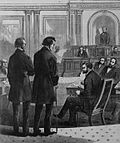 U.S. Reps. John A. Bingham and Thaddeus Stevens before the Senate addressing the impeachment vote on U.S. President Andrew Johnson.
U.S. Reps. John A. Bingham and Thaddeus Stevens before the Senate addressing the impeachment vote on U.S. President Andrew Johnson.
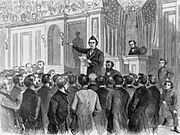 Stevens giving his closing remarks of the impeachment of President Johnson.
Stevens giving his closing remarks of the impeachment of President Johnson.
Stevens was so outspoken in his condemnation of the Confederacy that Major General Jubal Early of the Army of Northern Virginia made a point of burning much of his iron business, at modern-day Caledonia State Park to the ground during the Gettysburg Campaign. Early claimed that this action was in direct retaliation for Stevens' perceived support of similar atrocities by the Union Army in the South.
Stevens was the leader of the Radical Republicans, who had full control of Congress after the 1866 elections. He largely set the course of Reconstruction. He wanted to begin to rebuild the South, using military power to force the South to recognize the equality of Freedmen. When President Johnson resisted, Stevens proposed and passed the resolution for the impeachment of Andrew Johnson in 1868.
Stevens told W. W. Holden, the Republican governor of North Carolina, in December, 1866, "It would be best for the South to remain ten years longer under military rule, and that during this time we would have Territorial Governors, with Territorial Legislatures, and the government at Washington would pay our general expenses as territories, and educate our children, white and colored and both."[6]
Death
Thaddeus Stevens died at midnight on August 11, 1868, in Washington, D.C., less than three months after the acquittal of Johnson by the Senate. Stevens' coffin lay in state inside the Capitol Rotunda, flanked by a Black Honor Guard (the Butler Zouaves from the District of Columbia).[7] Twenty thousand people, one-half of whom were African-American, attended his funeral in Lancaster, Pennsylvania. He chose to be buried in the Shreiner-Concord Cemetery because it was the only cemetery that would accept people without regard to race.
Stevens wrote the inscription on his headstone that reads: "I repose in this quiet and secluded spot, not from any natural preference for solitude, but finding other cemeteries limited as to race, by charter rules, I have chosen this that I might illustrate in my death the principles which I advocated through a long life, equality of man before his Creator."
Stevens' monument is at the intersection of North Mulberry Street and West Chestnut Street in Lancaster, Pennsylvania.
Legacy
Thaddeus Stevens School, also known as Thaddeus Elementary School, located at 1050 21st Street, NW in Washington, D.C. The building was added to the National Register of Historic Places in 1980.
Stevens dreamed of a socially just world, where unearned privilege did not exist.[8] He believed from his personal experience that being different or having a different perspective can enrich society.[8] He believed that differences among people should not be feared or oppressed but celebrated.[8] In his will he left $50,000 to establish Stevens, a school for the relief and refuge of homeless, indigent orphans. "They shall be carefully educated in the various branches of English education and all industrial trades and pursuits. No preference shall be shown on account of race or color in their admission or treatment. Neither poor Germans, Irish or Mahometan, nor any others on account their race or religion of their parents, shall be excluded. They shall be fed at the same table."
This original bequest has now evolved into Thaddeus Stevens College of Technology. The College continually strives to provide underprivileged individuals with opportunities and to create an environment in which individual differences are valued and nurtured.
In Washington, D.C., the Stevens Elementary School was built in 1868 as one of the first publicly funded schools for black children. President Jimmy Carter's daughter, Amy Carter, attended the school.[9]
Other locations named in honor of Thaddeus Stevens includes the community of Stevens, Pennsylvania,[9]Stevens County, Kansas, Thaddeus Stevens Elementary School in New Castle, Pennsylvania,[9] and Thaddeus Stevens School in Lyndon Center, Vermont.[10]
Buildings associated with Stevens are currently being restored by the Historic Preservation Trust of Lancaster, PA with an eye toward focusing on the establishment of a $20 million dollar museum. These include his home, law offices, and a nearby tavern. The effort also celebrates the contributions of his housekeeper, Lydia Hamilton Smith, who was involved in the underground railroad.
Cinema and media portrayals
Austin Stoneman, the naive and fanatical congressman in D.W. Griffith's The Birth of a Nation, was modeled on Stevens. Additionally, he was portrayed as a villain in The Clansman, the second novel in the trilogy upon which Birth of a Nation was based. He was also portrayed (by Lionel Barrymore) as a villain and fanatic in Tennessee Johnson, the 1942 MGM film about the life of President Andrew Johnson. In May of 2011, Steven Spielberg cast Tommy Lee Jones to play Stevens in a film adaptation of the book Team of Rivals: The Political Genius of Abraham Lincoln, by Doris Kearns Goodwin, currently titled Lincoln.[11]
See also
Notes
- ^ Trefouse p. xi
- ^ "Thaddeus Stevens". Dictionary of American Biography. American Council of Learned Societies, 1928-1936.
- ^ [1]
- ^ Congressional Biography
- ^ Woodburn 178-179
- ^ Holden, Memoirs of W. W. Holden (1911) p. 85
- ^ "Thaddeus Stevens". New York Times. August 14, 1868. http://query.nytimes.com/gst/abstract.html?res=F00817FD3558147B93C6A81783D85F4C8684F9.
- ^ a b c Woodburn pp 606-620
- ^ a b c Knapp, Tom (2009-04-03). "Stevens to honor Stevens, Town was named for famous legislator, who got it a post office". Intelligencer Journal. http://articles.lancasteronline.com/local/4/235847. Retrieved 2009-05-09.
- ^ http://thestevensschool.com/
- ^ Yamato, Jen (5 May 2011). "Spielberg’s Lincoln Adds Tommy Lee Jones, Joseph Gordon-Levitt, John Hawkes". Movie Line. http://www.movieline.com/2011/05/spielbergs-lincoln-adds-tommy-lee-jones-joseph-gordon-levitt-john-hawkes.php. Retrieved 21 May 2011.
www.thethaddeusstevensschool.org
Further reading
- Beale, Howard K. The Critical Year: A Study of Andrew Johnson and Reconstruction. (1930)
- Belz, Herman. Reconstructing the Union: Theory and Practice During the Civil War. (1969)
- Benedict, Michael Les. A Compromise of Principle: Congressional Republicans and Reconstruction 1863-1869. (1974)
- Brodie Fawn M. Thaddeus Stevens, Scourge of the South (1959), controversial psychohistory
- Bryant-Jones, Mildred. "The Political Program of Thaddeus Stevens, 1865", Phylon (1940–1956), Vol. 2, No. 2 (2nd Qtr., 1941), pp. 147–154 in JSTOR/271784
- Foner, Eric. "Thaddeus Stevens, Confiscation, and Reconstruction," in Stanley Elkins and Eric McKitrick, eds. The Hofstadter Aegis (1974).
- McCall, Samuel Walker. Thaddeus Stevens (1899) 369 pages; outdated biography online edition
- Stryker, Lloyd Paul; Andrew Johnson: A Study in Courage (1929), hostile to Stevens online version
- Trefousse, Hans L. Thaddeus Stevens: Nineteenth-Century Egalitarian (1997) online version
- Woodburn, James Albert. The Life of Thaddeus Stevens: A Study in American Political History, Especially in the Period of the Civil War and Reconstruction. (1913) online version
- Woodburn, James Albert. "The Attitude of Thaddeus Stevens Toward the Conduct of the Civil War," The American Historical Review, Vol. 12, No. 3 (April, 1907), pp. 567–583 in JSTOR
- Zeitz, Josh. "Stevens, Thaddeus", American National Biography Online Feb. 2000.
Primary sources
- Palmer, Beverly Wilson and Holly Byers Ochoa, eds. The Selected Papers of Thaddeus Stevens 2 vol (1998), 900pp; his speeches plus letters to and from Stevens
- Stevens, Thaddeus, et al. Report of the Joint Committee on Reconstruction, at the First Session ...by United States Congress. Joint Committee on Reconstruction, (1866) 791 pages; online edition
- Memorial Addresses on the Life and Character of Thaddeus Stevens: Delivered ...by United States 40th Cong., 3d sess., 1868-1869. (1869) 84 pages; online edition
External links
- Stevens and Smith Historic Site
- Thaddeus Stevens Society
- Thaddeus Stevens at the Biographical Directory of the United States Congress. Includes Guide to Research Collections where his papers are located.
- Thaddeus Stevens's Legacy
- Biography from Spartacus Schoolnet
- Article from Civilwarhome.com
- Biography from MrLincolnsWhiteHouse.org
- Biography from Impeach-AndrewJohnson.com
- Mr. Lincoln and Freedom: Thaddeus Stevens
- Mr. Lincoln's White House: Thaddeus Stevens
- Thaddeus Stevens at The Political Graveyard
- Thaddeus Stevens at Find A Grave
- Thaddeus Stevens: A Man Before His Time
- Thaddeus Stevens: Champion of Freedom
United States House of Representatives Preceded by
Anthony RobertsMember of the U.S. House of Representatives
from Pennsylvania's 9th congressional district
1859–1868Succeeded by
Oliver DickeyPreceded by
John StrohmMember of the U.S. House of Representatives
from Pennsylvania's 8th congressional district
1849–1853Succeeded by
Henry MulenbergPolitical offices Preceded by
John ShermanChairman of the House Ways and Means Committee
1861–1865Succeeded by
Justin MorrillHonorary titles Preceded by
Abraham LincolnPersons who have lain in state or honor
in the United States Capitol rotunda
August 13-August 14, 1868Succeeded by
Charles SumnerStevens • Washburne • Dawes • Garfield • Randall • Holman • Atkins • Hiscock • Randall • J. Cannon • Holman • Sayers • J. Cannon • Hemenway • Tawney • Fitzgerald • Sherley • Good • Madden • Anthony • Wood • Byrns • Buchanan • Taylor • C. Cannon • Taber • C. Cannon • Taber • C. Cannon • Mahon • Whitten • Natcher • Obey • Livingston • Young • Lewis • Obey • RogersAmerican Civil War (outline) Origins - Combatants
- Theaters
- Campaigns
- Battles
- States
CombatantsTheatersMajor battles- Fort Sumter
- 1st Bull Run
- Wilson's Creek
- Fort Donelson
- Pea Ridge
- Hampton Roads
- Shiloh
- New Orleans
- Corinth
- Seven Pines
- Seven Days
- 2nd Bull Run
- Antietam
- Perryville
- Fredericksburg
- Stones River
- Chancellorsville
- Gettysburg
- Vicksburg
- Chickamauga
- Chattanooga
- Wilderness
- Spotsylvania
- Cold Harbor
- Atlanta
- Mobile Bay
- Franklin
- Nashville
- Five Forks
Involvement
by state or territoryLeaders ConfederateMilitaryCivilianUnionMilitaryCivilianAftermath - Alabama Claims
- Carpetbaggers
- Freedman's Bank
- Freedmen's Bureau
- Jim Crow laws
- Redeemers
- Southern Claims Commission
Cemeteries- Confederate memorials and cemeteries
- National cemeteries
- U.S. memorials and cemeteries
VeternsOther topics- Related topics
- Categories
Related topicsMilitaryPoliticalOther topicsCategories- American Civil War
- People
- Battles
- Union Army generals
- Union armies
- Union Army corps
- Confederate States of America (CSA)
- Confederate Army generals
- Confederate armies
- Spies
- National Battlefields
- Veterans' organizations
- Medicine
- Museums
- Forts
- Old soldiers' homes
- Prisons
- Reconstruction
- U.S. memorials and cemeteries
- Confederate memorials and cemeteries
American Civil War at sister projects  American Civil War portal
American Civil War portal Military History: American Civil War
Military History: American Civil War Special Project: Brothers at War
Special Project: Brothers at War
Categories:- 1792 births
- 1868 deaths
- People from Danville, Vermont
- Pennsylvania Federalists
- Pennsylvania Whigs
- Pennsylvania Republicans
- Radical Republicans
- American abolitionists
- Dartmouth College alumni
- Impeachment of Andrew Johnson
- Members of the Pennsylvania House of Representatives
- Members of the United States House of Representatives from Pennsylvania
- Pennsylvania lawyers
- People of American Reconstruction
- People of Pennsylvania in the American Civil War
- Union political leaders
- Pennsylvania Anti-Masonics
Wikimedia Foundation. 2010.

